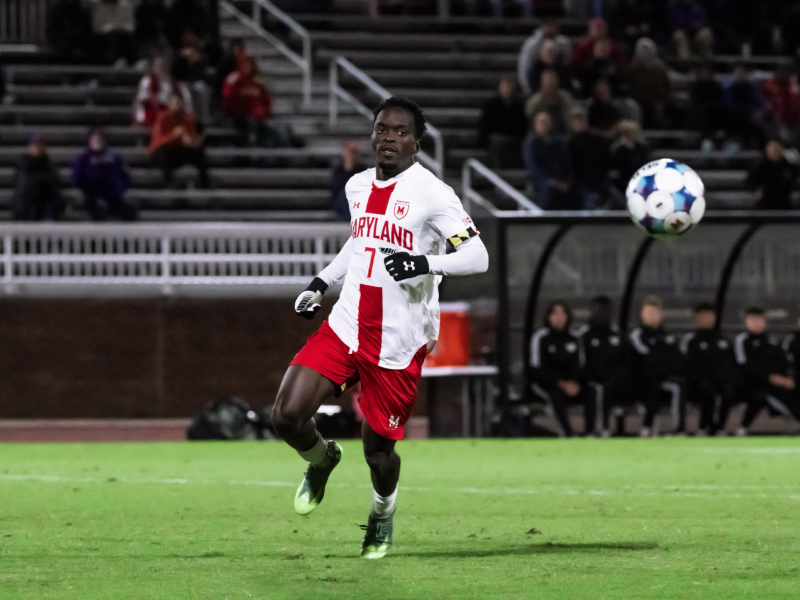The University of Maryland’s student chapter of the NAACP delivered a letter to university President Wallace Loh last week expressing concerns about its exclusion from the Byrd Stadium Naming Work Group.
The letter, which chapter president Ceaira Thomas and vice president Olayinka Ajayi delivered to the Main Administration Building on Oct. 13, stated that while NAACP members are happy to see Loh considering a name change, they feel the work group should have included a student representative from their organization or another organization that reflects the specific interests of students of color.
Thomas, who authored the letter, said the chapter has been working on the issue of the renaming of Byrd Stadium since the spring but was not considered for representation in the work group or notified that the work group was forming.
“As you also know, it was members of the NAACP who in fact initiated, advocated, and have fought for this entire wave of efforts to change the name of Byrd Stadium. We find it unfortunate that we have been eliminated from the conversation,” Thomas, a senior economics major, wrote in the letter.
The NAACP chapter has held town hall meetings, protests and discussions in response to racial issues such as Michael Brown’s shooting in Ferguson, Missouri, and a Kappa Sigma fraternity member’s offensive email. At each of these events, members of the chapter collected feedback about Byrd Stadium and a potential name change, Thomas said.
Members of the group also interviewed black athletes and worked with the Student Government Association to pass a resolution supporting a name change.
“I feel like we should have been the first choice” to include in the work group, Thomas said in an interview. “But it’s not about our group in particular, it’s about the black community not being represented in the right way.”
READ MORE: Byrd work group focuses on history, policy, community input, context
Loh formed the Byrd Stadium Naming Work Group last month to address claims that former university President Harry Clifton “Curley” Byrd was a racist and a segregationist. The group consists of four subcommittees responsible for studying the history of the stadium and its namesake, researching university system naming policies, examining how other institutions are handling similar issues, informing the community and gathering public opinion.
Loh said the work group was meant to be “a large, diverse group” and those who chose the members thought it “represented a diversity of views.”
“We’re trying to select people who will bring a particular expertise or perspective,” Loh said. “We spend a lot of time selecting those groups.”
Administrators appointed the members of the work group. Members include alumni, donors, faculty, staff, students and athletic department representatives.
The work group includes two undergraduate students, one of whom is a member of a multicultural organization, Thomas said. While multicultural representation is positive, Thomas said, the Byrd Stadium naming issue specifically concerns the black community; therefore, black students should receive representation in the work group.
Thomas said the lack of representation for black athletes is “the biggest slap in the face of all.”
Colin Byrd, a senior sociology major and chief lobbyist with the NAACP, delivered a petition to rename the stadium to university administration in March.
Based on university policy, Byrd said, “the only logical conclusion” is to rename the stadium. Failure to do so would “preserve an egregious symbol of white supremacy.”
“There are specific guidelines within the university’s policy that say, ‘Look, if this person’s public image and integrity conflicts with the purpose and mission of the University of Maryland, College Park, or any of the other [University System of Maryland] institutions, or the USM as a whole. … No naming should be permitted for an individual like that,’” Byrd said. “The policy is very clear.”
According to a recent Diamondback poll, 78 percent of 866 respondents oppose a Byrd Stadium name change.
Thomas said her organization has had conflict with university administration in the past because of members speaking bluntly about racial issues on the campus. In the letter, Thomas wrote that she is “very interested in restoring the relationship between the Administration and our NAACP chapter, so that we may advocate through it, instead of around it.”
She also requested that her chapter meet with university administrators and be involved with nominating a member of the President’s Student Advisory Council on Diversity & Inclusion, which Loh announced earlier this month.
Thomas said she did not ask administrators to add a member to the name change committee because her chapter does not want to delay the process, but does want to be involved in other ways.
“When you’re hand-picking people to sprinkle onto a board that look colorful, that’s not true inclusion,” Thomas said. “What I would like to see moving forward is for the administration to get opinions from representatives of actual groups who accurately represent colored interests in particular instead of, you know, hand-picking agreeable colored students.”
Senior staff writer Ellie Silverman contributed to this report.


